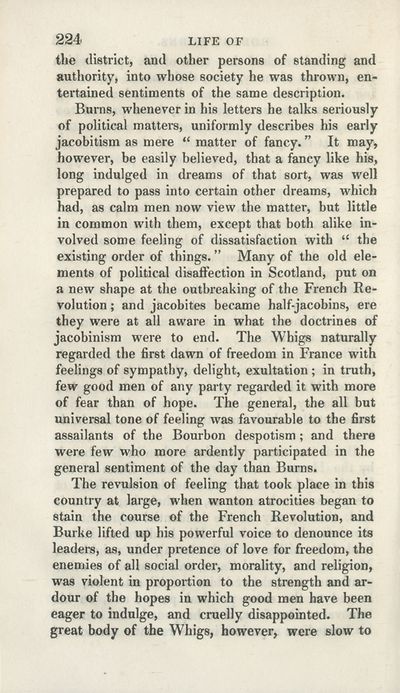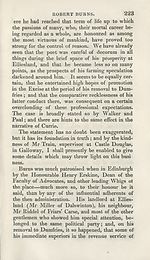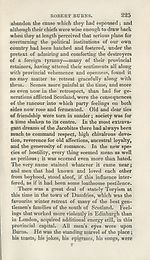Scotland/Scots > Life of Robert Burns
(234)
Download files
Complete book:
Individual page:
Thumbnail gallery: Grid view | List view

224 LIFE OF
the district, and other persons of standing and
authority, into whose society he was thrown, en¬
tertained sentiments of the same description.
Burns, whenever in his letters he talks seriously
of political matters, uniformly describes his early
jacobitism as mere “ matter of fancy. ” It may,
however, be easily believed, that a fancy like his,
long indulged in dreams of that sort, was well
prepared to pass into certain other dreams, which
had, as calm men now view the matter, but little
in common with them, except that both alike in¬
volved some feeling of dissatisfaction with “ the
existing order of things. ” Many of the old ele¬
ments of political disaffection in Scotland, put on
a new shape at the outbreaking of the French Re¬
volution ; and Jacobites became half-jacobins, ere
they were at all aware in what the doctrines of
jacobinism were to end. The Whigs naturally
regarded the first dawn of freedom in France with
feelings of sympathy, delight, exultation ; in truth,
few good men of any party regarded it with more
of fear than of hope. The general, the all but
universal tone of feeling was favourable to the first
assailants of the Bourbon despotism; and there
were few who more ardently participated in the
general sentiment of the day than Burns.
The revulsion of feeling that took place in this
country at large, when wanton atrocities began to
stain the course of the French Revolution, and
Burke lifted up his powerful voice to denounce its
leaders, as, under pretence of love for freedom, the
enemies of all social order, morality, and religion,
was violent in proportion to the strength and ar¬
dour of the hopes in which good men have been
eager to indulge, and cruelly disappointed. The
great body of the Whigs, however, were slow to
the district, and other persons of standing and
authority, into whose society he was thrown, en¬
tertained sentiments of the same description.
Burns, whenever in his letters he talks seriously
of political matters, uniformly describes his early
jacobitism as mere “ matter of fancy. ” It may,
however, be easily believed, that a fancy like his,
long indulged in dreams of that sort, was well
prepared to pass into certain other dreams, which
had, as calm men now view the matter, but little
in common with them, except that both alike in¬
volved some feeling of dissatisfaction with “ the
existing order of things. ” Many of the old ele¬
ments of political disaffection in Scotland, put on
a new shape at the outbreaking of the French Re¬
volution ; and Jacobites became half-jacobins, ere
they were at all aware in what the doctrines of
jacobinism were to end. The Whigs naturally
regarded the first dawn of freedom in France with
feelings of sympathy, delight, exultation ; in truth,
few good men of any party regarded it with more
of fear than of hope. The general, the all but
universal tone of feeling was favourable to the first
assailants of the Bourbon despotism; and there
were few who more ardently participated in the
general sentiment of the day than Burns.
The revulsion of feeling that took place in this
country at large, when wanton atrocities began to
stain the course of the French Revolution, and
Burke lifted up his powerful voice to denounce its
leaders, as, under pretence of love for freedom, the
enemies of all social order, morality, and religion,
was violent in proportion to the strength and ar¬
dour of the hopes in which good men have been
eager to indulge, and cruelly disappointed. The
great body of the Whigs, however, were slow to
Set display mode to:
![]() Universal Viewer |
Universal Viewer | ![]() Mirador |
Large image | Transcription
Mirador |
Large image | Transcription
| Antiquarian books of Scotland > Scotland/Scots > Life of Robert Burns > (234) |
|---|
| Permanent URL | https://digital.nls.uk/108248667 |
|---|
| Description | Thousands of printed books from the Antiquarian Books of Scotland collection which dates from 1641 to the 1980s. The collection consists of 14,800 books which were published in Scotland or have a Scottish connection, e.g. through the author, printer or owner. Subjects covered include sport, education, diseases, adventure, occupations, Jacobites, politics and religion. Among the 29 languages represented are English, Gaelic, Italian, French, Russian and Swedish. |
|---|

